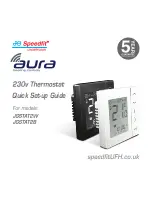
CAUTION!
Risk of external consumer bursting
Scalding, cold burns
Adjust the pump pressure with the bypass.
The following information is only relevant for the Integral XT device:
n
You can increase or reduce the pump pressure via the pump levels.
n
You can limit the pump pressure via the pressure control.
n
For pressure-sensitive consumers (e.g. glass apparatus) with a maximum
permissible working pressure below the maximum pressure of the pump
(with Integral T pressure 3.5 bar, with Integral XT pressure 7.0 bar),
the hoses of the consumer must be laid in such a way that kinking or
squeezing is not possible. In addition, a separate safety pressure relief
valve must be installed to protect against operating errors.
n
To ensure temperature control at high loads (> 70 % cooling), a suffi-
ciently high flow rate (at least pump level 4) must be ensured, especially
at viscosities above 50 mm²/s. At least pump level 6 must be set
for high-performance devices such as the Integral IN 2560 XTW and
IN 2560 PW.
n
The device should preferentially be operated at a higher pump level (at
least pump level 4, the higher the better). If the pressure in the outflow
becomes too high for the application, open the internal bypass of the
constant temperature equipment.
n
The error message “Evaporator frozen" and/or strongly fluctuating tem-
peratures indicate that the flow rate in the device is too low (see also
Chapter 10.3 “Troubleshooting” on page 149).
n
If the viscosity of non-LAUDA heat transfer liquids rises above
50 mm²/s within the desired working temperature range (e.g. glycol-
water mixture below -25 °C), you must enter the viscosity data of this
heat transfer liquid in the constant temperature equipment (see also
Further information on page 70). LAUDA Kryo 30 can be selected
as an alternative when using a glycol-water mixture as the heat transfer
liquid.
n
If a low flow rate is required at high load, LAUDA recommends using the
MID 80 flow controller (LAUDA catalog number L003217) for electri-
cally conductive heat transfer liquids. The flow controller ensures that
sufficient flow in the constant temperature equipment is guaranteed via
its internal electronic bypass.
Please note:
n
The device may only be moved after it has been drained. The device
must be taken out of operation to do this.
6.2 Operating modes
The device supports two operating modes.
n
In
Operation
mode, the components of the device are operational.
n
In
Standby
mode, all device component are switched off. Power is only
supplied to the display on the device. This operating mode is suitable for
adjusting multiple settings, for example.
A program that has been started is paused in
Standby
mode. After acti-
vating
Operation
mode, the program must be resumed again manually.
V6
Integral Process Thermostats and High-Temperature Thermostats
88 / 198
















































